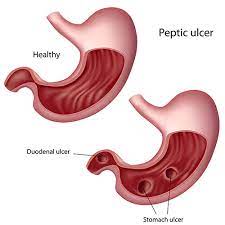A medical scientist, Prof. Stella Smith, says Helicobacter pylori (H. pylori) has been given minimal attention in spite of its infecting and causing diverse disease conditions among many persons.
Smith, Director of Research, Nigerian Institute of Medical Research (NIMR), said this during the Health Writers Association of Nigeria (HEWAN) week on Thursday in Lagos.
Smith, who is also the President, African Helicobacter & Microbiota Study Group (AHMSG), said this while speaking on a paper titled, “Helicobacter pylori :The Peptic Ulcer Bug Neglected But Unrelenting.”
H. pylori are bacteria that can cause an infection in the stomach or small intestine.
The pathogen is the most common cause of different gastric disorders including gastritis, peptic ulcer disease, gastric mucosa associated lymphoid tissue (MALT) lymphoma and gastric adenocarcinoma.
H. pylori bacteria are usually transmitted from person to person through direct contact with saliva, vomit or stool. It may also be spread through contaminated food or water.
The International Agency for Research on Cancer (IARC), a division of the World Health Organisation (WHO), categorised H. pylori as a class one carcinogen.
Smith said that 50 per cent of the world’s population are infected with H. pylori with people of different race and regions around the world having varied levels of severity and pathological outcomes.
According to her, the infection burden in Africa is high with a reported prevalence of 70.1 per cent, however, could be higher due lack of data in some regions of the continent.
“In Nigeria the prevalence of H. pylori infection varies with northern Nigeria having more cases than other parts of the country,” she said.
However, Smith said that in spite of the prevalence and associated pathological outcomes attached with the infection, H. pylori infection was obviously a neglected disease in Africa.
“Most other infectious disease like HIV, malaria, tuberculosis and more recently COVID-19 have more attention in terms of research funding and grants,’ she said.
She stressed the importance of accurate and prompt diagnosis as key to managing, treating and eradicating H. pylori disease.
“Lack of awareness or misdiagnosis that every stomach ache seem to be ulcer remains a major problem in Africa, most especially Nigeria,” she said.
Smith said that the treatment for H. Pylori was based on recommended antisecretory combination of drugs and antibiotics.
“Unfortunately, due to misuse and over use of antibiotics, several bacterial pathogens including H. pylori have developed resistance to antibiotics.
“This is posing a big challenge to the effective treatment and eradication of H. pylori infection.
“There is no treatment regimen which guarantees cure of H. pylori infection in 100 per cent of patients,” she said.
She said that selected treatment must consider local antibiotic resistance patterns (if known), previous exposure and allergies to specific antibiotics, cost, side effects, and ease of administration.
“With the widespread number of resistance studies showing to commonly prescribed antibiotics in Africa, it is time to produce a consensus guideline to guide clinicians on the choice of antibiotic combination for H. pylori eradication,” she said.
Smith stressed the need for accurate diagnosis and treatment led to the formation of the AHMSG.
She added that the group was working on a guidelines for H. pylori management in Africa.
She said that H. pylori infection was wide spread, advising the public to ensure necessary precautions to prevent infection, and if infected they should seek prompt medical attention. (NAN)



